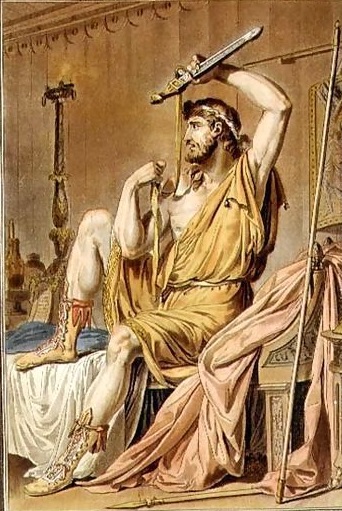Agamemnon
the Greek leader in the great Trojan war
Agamemnon was the Greek leader in the great Trojan war. The war made him recognisable throughout historical and mythological recordings, even to this day. Despite his heroics and great leadership, Agamemnon was a casualty of unfortunate events in his family which were based on treachery, rape, murder and incest.
He managed to run away and take refuge in Sparta with his brother Menelaus who then became king of Sparta and helped Agamemnon to reclaim his throne in Mycenae. When Helen of Sparta was abducted, Menelaus called upon his brother who became the leader of the Greeks in Trojan war that lasted ten years.
Agamemnon himself managed to survive, but was murdered upon his arrival from the war, by either his wife Clytemnestra whom he married while at Sparta or her lover who happened to be Aegisthus, the son of his uncle Thyestes who fathered him with his own daughter Pelopia.
Appearance in the works of art
In the works of art, Agamemnon`s depiction resemble and is very similar to the representation of Zeus, king of the gods. Agamemnon is generally depicted wearing a diadem and holding a scepter which are among conventional attributes of kings.
Family quarrel
In his early life, there were plenty of things going wrong. His father Atreus murdered the children of his twin brother Thyestes, after finding out his adultery with his wife Aerope. Atreus even went so far that the murdered children were on the menu of Thyestes for a while.
However, Atreus hadn't murdered all his children, because he didn`t know about Aegisthus who was the son of Thyestes and Thyestes' daughter Pelopia. It was not long, before Aegisthus took revenge on Atreus and murdered him.
He then took possession of the throne of Mycenae and ruled hand to hand with Thyestes. Together, they exiled Agamemnon and Menelaus from Mycenae. The brothers took refuge with Tyndareus, the king of Sparta, where they married the king's daughters Helen and Clytemnestra.
Agamemnon and Clytemnestra together had four children, one son and three daughters. Eventually Menelaus succeeded Tyndareus in Sparta and with his superior army helped his brother to drove away Thyestes and reclaim his throne in Mycenae. For a while they enjoyed a decent life, until Paris kidnapped Helen, the wife of his brother Menelaus.
Trojan war
This act, which was caused by the gods themselves, led to a war between Greeks and Trojans. And king Agamemnon led his people into a battle. He had to overcome his first obstacle while still in Greece. He offended Artemis by killing one of her sacred animals and the angry goddess obstructed their departure from Boeotia. Greek soldiers were becoming more and more reluctant and therefore he had to sacrifice one of his daughters, called Iphigenia to the angry goddess.
Finally Agamemnon made peace with Artemis, gathered his army including two of the finest heroes, Odysseus and Achilles, and set sail for Troy. Agamemnon then led his men into the battlefield, filled them with good positive morale and himself fought bravely. He killed many Trojans, until he was finally wounded and forced to withdraw to his camp. It looked like they were going to win with ease, until his act to take away Briseis from Achilles, after losing Chryseis to Apollo.
Briseis was a local woman of great beauty whom Achilles took for himself, after clearing the village in the Trojan land. It resulted for Achilles to withdrawing himself from the battlefield as revengeful act. The Greeks consequently started losing the battles and morale was getting lower and lower. However, later on, as you probably already know, Achilles returned to battle when his closest friend was killed and Agamemnon finally gave up on Briseis and returned her to him.
And eventually with Achilles killing Hector and Odysseus` great disguise in the shape of a Trojan horse, the Greeks managed to capture the city of Troy and win the war. Agamemnon took Cassandra, the daughter of Priam, the former king of Troy, as his reward and set sail back to Greece.
Murder of Agamemnon
Meanwhile, his wife Clytemnestra was having an affair with no-one else than his foe Aegisthus. When Agamemnon came home, he was killed by either Aegisthus or Clytemnestra. According to the accounts given by the tragedians, Agamemnon was slain in a bath by his wife alone, where she had first thrown a net or a blanket of cloth over him to prevent resistance and then killed him with an axe. Clytemnestra also killed Cassandra.
It is said, that her motives for the crime were jealousy of his new lover Cassandra and her wrath at the sacrifice of Iphigenia, as also his departure to war over the Helen of Troy. Clytemnestra and her lover Aegisthus then ruled the kingdom for some time, until Agamemnon's son Orestes, with the help of his sister Electra, avenged his father's death by murdering Aegisthus and his own mother Clytemnestra.
It is said that repeating treachery through generations resulted in a wrath of Erinyes who tracked down these sinners with their hounds and drove them to insanity.
[1]













